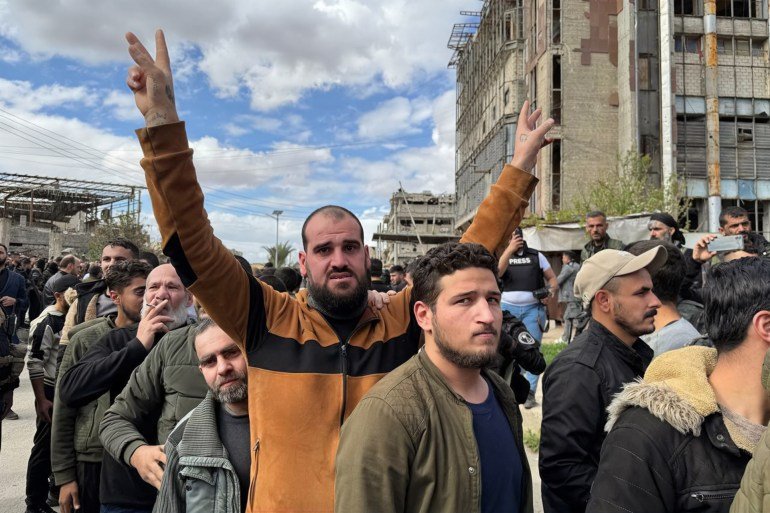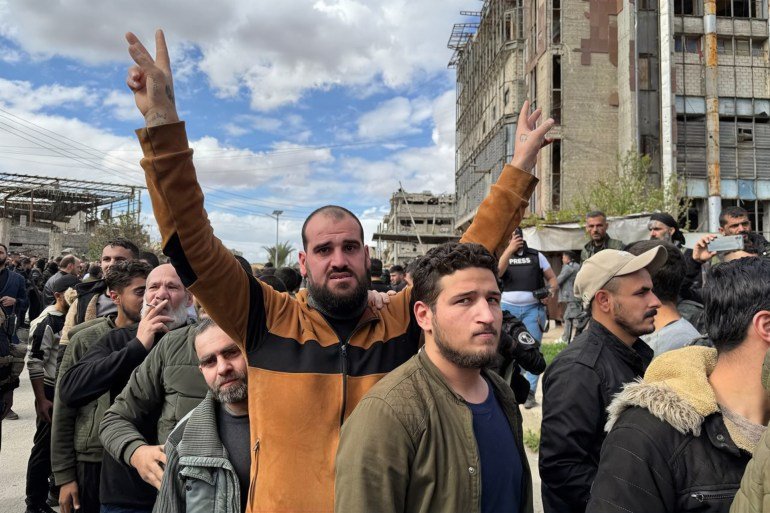Damascus Countryside – In order to settle civilian and societal conflicts and fair arbitration in the outstanding questions between the disputed concations, the elders, the rights and religious leaders have formed public councils of reconciliation in the Syrian cities and villages, and a certain number of these councils practice its work in coordination with the public prosecutions of the Syrian Ministry of Justice.
The council magistrate of the city of Duma, one of the suburbs of Damascus and its campaign center, is a model example of these advice, as it was formed in February and has so far been able to solve and separate dozens of problems which have been presented to it by the inhabitants of the east of Ghouta.
The Council includes judges, lawyers, religious leaders and businessmen, and it endeavors to overcome the legacy of discrimination, which was left by the policies of the Syrian regime listed between the Syrians for 14 years, and to contain the various conflicts which took place after the fall of Bashar al-Assad on December 8, and the return of thousands of people was demolished to their homes in the countries of Damascus.

With conviviality and mercy
The Magistrate Council aims to rebuild confidence between all the components of Syrian society, to transcend the current challenges and to establish rules which guarantee the continuity of the reform path after the victory of the Syrian revolution, based on a group of local experiences in Douma.
On the reasons for the creation of the Council magistrate in Douma, founder of the Council, Eng. Nizar Al -Madi, says that “the main motivation lies in the establishment of societal reconciliation because of its importance in the construction of a stable society and the promotion of civil peace after the victory of the Revolution in Syria”.
Al -Smadi adds to Al -jazeera net that this is done “by resolving the differences that occurred due to the division of society in Syria between supporters and adversaries because of the malicious role that the deceased regime played by devoting the horizontal differences between Syrians in society and cities and even among members of the same family.”
He continues that the Council strives to perpetuate reconciliation which puts an end to the differences between litigants in “Friendly and based on the principles of justice, mercy and wisdom”.
In addition, the Council can resort to arbitration, if conciliation is impossible between litigants, such as a means of resolving disputes outside the courts in coordination with public prosecution, which makes the advice of the council to “contain” when the two parties assist them and indicate them on the instrument of acceptance.
Al -Madi says that the members of the Council were carefully chosen, made up of 16 people, divided into three committees, and each committee includes a religious, controlled and legal leader (judge or lawyer) and a real estate expert in addition to one of the elders of the city.
On the arbitration mechanisms, Al -Madi says that it begins with the signing of the two parties which are disputed by an arbitration instrument which requires their acceptance of the decision of the council, then the facts are written between the litigants, and listening to witnesses and all the parties before resorting to reconciliation or decision.
The importance of the council comes from its commitment to the principle of conciliation which prevails, because its members have been able to do so, resolve business in a relatively short time compared to the courts, facilitate legal procedures, reduce the costly costs of legal proceedings and reduce the burden of the competent authorities.
https://www.youtube.com/watch?v=L_T_QMVSHAC
The monarchy is the most conflict
“The differences are important between people, and there is great pressure on the judiciary, and therefore the council has been established, and the most important thing we adhere to is to satisfy both parties to the conflict as much as possible, and that the solution or the judgment is required.”
Since its creation, the Council has received various problems which included family disputes, partnerships, combat problems, royal conflicts and traffic accidents, which are problems “, most of which have been resolved by the grace of God”, according to Harun.
While Nizar Al -Smadi refers to the tyranny of “property disputes” on all the other questions presented to the Council, due to a decree imposed by the “deceased system” which was not recognized by the sales and purchase contracts issued in areas out of its will in 2012.
Al -Smadi, who headed the municipality of Duma and was a member of the local councils of Eastern Ghouta when the revolutionaries took control, added at the time to record these contracts at the time, but with the return of Eastern Ghouta to the control of the regime in 2018, the latter canceled all the contracts supervised by local councils.
He says: “In addition, many weak souls have visited contracts for purchase and sale, thinking that in disgraced force will not return to their cities, so that many property disputes will come to us.”
https://www.youtube.com/watch?v=RBSGGUGHNA6O
In addition to property issues, there are complaints linked to conflicts between supporters and opponents of the previous regime, and the questions of a family dispute, in which the Council resorted to arbitration according to the principle of “holding a virtue or a layout with charity”, which contributes to a stable family of the family to the main circles such as the solution of differences and conflicts between entire cities.
This advice differs from the other reconciliation councils that were established after the fall of the regime due to its merger of reconciliation committees with arbitration at the same time, while other advice depend only on conciliation procedures, and may not include two binding or control specialists.
Assembly tasks
Several cities in Syria have attended the creation of public reconciliation councils since the fall of the Bashar Al -Sad regime, such as the Al-Hamra district council in the eastern Hama campaign, the Magistrate Council of the Al-Sabikhan sector in the government of the Deir al-Aleppo area.
Most of these councils work in coordination with the “General Magistrate Council” in the Harem area of the Governor of Idlib, which was created at the beginning of 2024 in coordination with the competent authorities of the city of Idlib, which was then under the control of the Syrian armed armed factions.
The General Magistrate Council Determines Its Duties in Promoting Islamic and Moral Values Such As Pardon, Cooperation, Tolerance and Affection, Containing Conflicts and Resolving Them Away from Violence, enhancing the Unity and Cohesion of Community Members and Mainaining Its Balance, Reducing the Burden on the Role of the Judiciary and Giving Them a Greater Focus for Dealing With Major Issues, Rejecting Hatred and Fanaticism and Spreading A Culture of Tolerance and Coexistence between people and reduce the material cost of the problems that money is a condition for solving it.
These advice also strengthen stability throughout Syria and disseminate a culture of resolution of disputes by peaceful means without deriving violence, in the light of the rigidity of the official path of transitional justice in the countries of war, and have separated and created the hostilities between its residents for 14 years.

